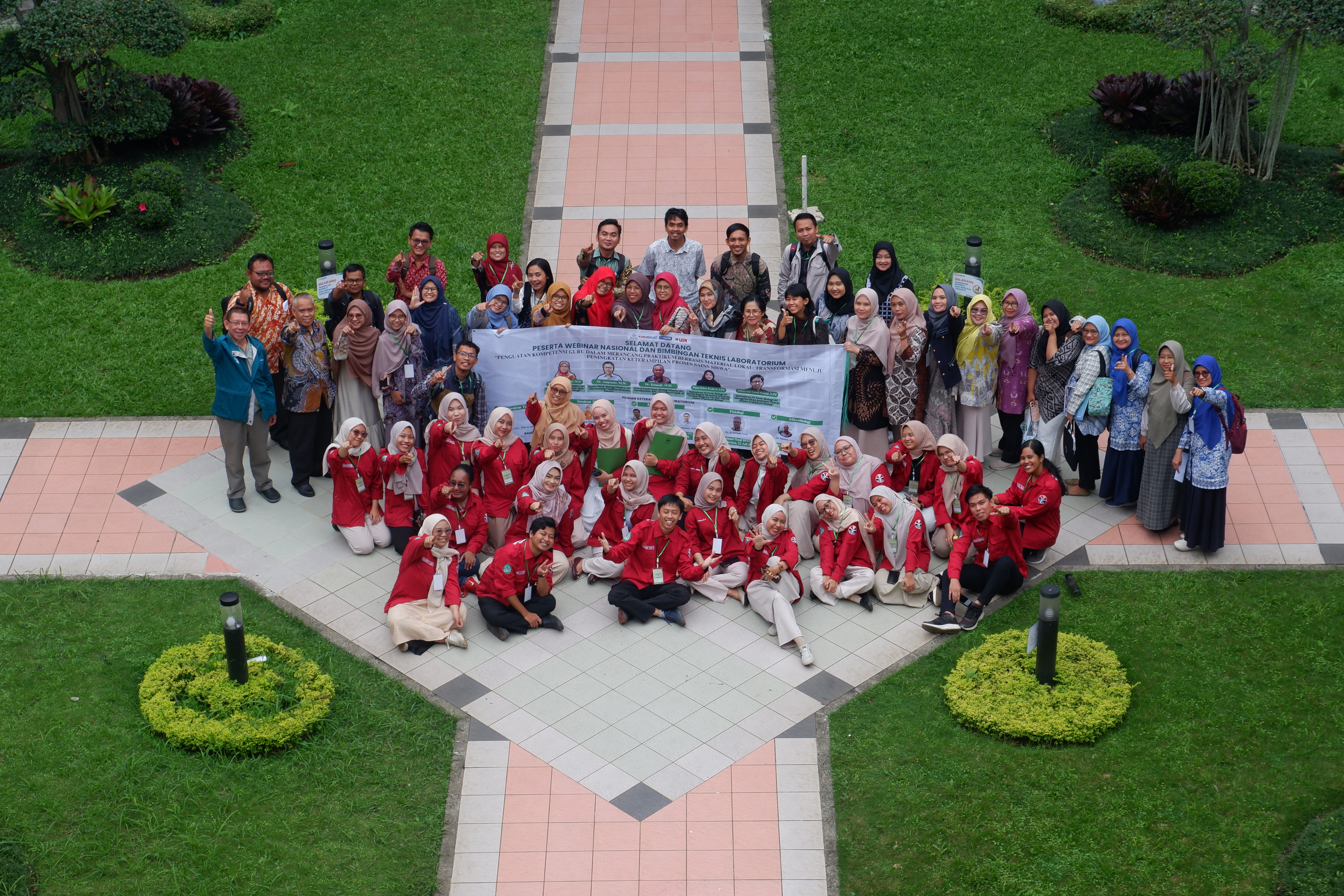|
|
In response to the demands of the Merdeka Curriculum, which emphasizes contextual learning and the development of 21st-century skills, students from the Master’s Program in Biology Education at the University of Education Indonesia (UPI) organized a series of activities titled “Enhancing Teachers’ Competencies in Designing Laboratory Experiments Using Local Materials: A Transformation Toward Improving Students’ Scientific Process Skills.”
This initiative is designed to make a concrete contribution to enhancing teachers’ capacity to develop meaningful science education rooted in the local environment and aligned with the strengthening of scientific process skills as outlined in the Merdeka Curriculum.
The series of activities comprises three main phases: a National Webinar, Technical Guidance (BIMTEK), and an Online Evaluation.
Inspirational Webinar: 182 Teachers from Various Regions Participate
The event started with a National Webinar on June 14, 2025, attended by 123 teacher participants from various regions across Indonesia. The webinar featured academic and educational practitioners from the Biology Department of the Faculty of Mathematics and Natural Sciences (FMIPA) at UPI: Dr. Kusnadi, M.Si., Dr. Yanti Handiyati, M.Si., and Dr. Amprasto, M.Si., who discussed the importance of innovation in laboratory experiments by utilizing local materials as experimental materials and field trip learning in biology education. The next speakers were Master’s students in Biology Education at UPI, Puan Helwa Soraya, who discussed Ancor and Novak Gowin, followed by Baharudin Yusuf Haqiqi, who addressed Performance Assessment in Biology Laboratory Experiments. The discussion focused on strategies for designing cost-effective laboratory experiments that strengthen students’ scientific process skills (SPS), such as observation, classification, interpretation, and experimentation, as well as how to assess these laboratory activities.
.png)
Intensive BIMTEK: Designing Contextual and Creative Practical Sessions
The series continued on June 19, 2025, with a Technical Guidance (BIMTEK) session attended by 35 selected participants at the JICA Building, FPMIPA UPI. This BIMTEK activity collaborated with MGMPs from various regions, including the City of Bandung, Bandung Barat Regency, Cimahi Regency, Subang Regency, Purwakarta Regency, Cianjur Regency, Sumedang Regency, Cilegon City, and Tangerang City. In this session, teachers were directly trained to design applicable practical activities based on local potential. The BIMTEK participants were divided into five laboratories: Physiology Laboratory, Microbiology Laboratory, Animal Structure Laboratory, Plant Structure Laboratory, and Ecology Laboratory. Each laboratory was facilitated by Master’s students in Biology Education from the 2024 cohort, accompanied by Biology Education lecturers from the Faculty of Mathematics and Natural Sciences (FMIPA) at UPI, namely Dr. Kusnadi, M.Si., Dr. Rini Solihat, M.Si., Dr. Bambang Supriatno, M.Si., Dr. Amprasto, M.Si., Dr. H. Saefudin, M.Si., Drs. H. Dadang Machmudin, M.Si., Prof. Dr. Hj. Nuryani Rustaman, M.Pd.,Dr. Hj. Sariwulan Diana, M.Si., dan Dr. Yanti Hamdiyati, M.Si. Participants critiqued the standard Laboratory Activity Design and reconstructed it based on analysis results, followed by direct testing, group discussions, and designing student worksheets that integrate local wisdom values and scientific process skills. Participants’ enthusiasm was evident from the numerous creative ideas generated, ranging from photosynthesis experiments using local plants to ecology experiments.
_(1).png)
_(2).png)
Online Evaluation: Commitment to Sustainability
As a follow-up, the activity will conclude with an Online Evaluation on July 22, 2025, to measure the effectiveness of implementing training outcomes in each classroom. This evaluation also serves as a reflection forum for teachers applying contextual learning aligned with the Pancasila Student Profile and student-centered learning principles.
The activity received positive feedback from participants who were motivated to transform their surroundings into open-air laboratories. The transformation of biology education no longer relies on formal laboratories. Still, it can emerge from teachers’ ecological awareness and creativity in designing student learning experiences.
With the collaborative spirit between graduate students and teachers in the field, this activity is a model for empowering teachers’ professionalism, directly impacting the quality of biology education in schools. For a recap of the activities, please visit the Instagram account of UPI Biology Education (https://www.instagram.com/reel/DLNIf9kRcdT/).



